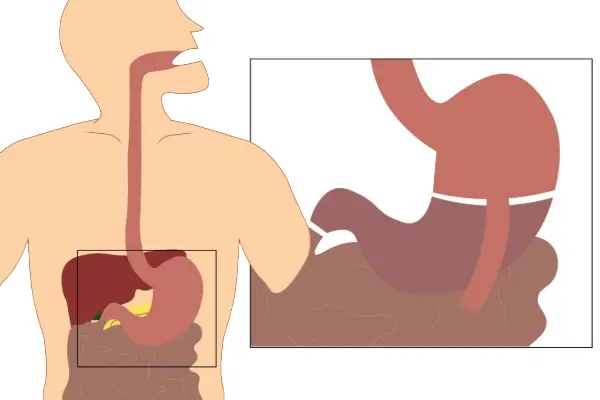
What Is Duodenal Switch Surgery?
The Duodenal Switch (DS), also known as Biliopancreatic Diversion with Duodenal Switch (BPD/DS), is one of the most powerful and effective types of bariatric surgery. It combines two approaches to weight loss: reducing the size of the stomach (restriction) and rerouting the intestines (malabsorption).
The procedure begins with a sleeve gastrectomy, where about 70–80% of the stomach is removed, leaving a narrow, tube-shaped stomach. Unlike a gastric bypass, the stomach’s valve (pylorus) and the first portion of the small intestine (duodenum) are preserved, helping maintain more natural digestion.
Next, the surgeon divides the small intestine and attaches the last portion directly to the duodenum. The bypassed section of intestine is reconnected lower down, allowing bile and pancreatic juices to mix with food later in the digestive process. This unique rerouting reduces calorie and nutrient absorption, while the smaller stomach size limits how much food can be eaten at one time.
The result is a dual mechanism for weight loss — less food consumed and fewer calories absorbed.
Why Choose Duodenal Switch Surgery?
The duodenal switch is considered the most effective bariatric surgery for long-term weight loss, particularly for patients with severe obesity or those with significant obesity-related health conditions such as:
- Type 2 diabetes
- High blood pressure
- High cholesterol
- Obstructive sleep apnea
- Severe metabolic syndrome
Studies show that patients who undergo a duodenal switch often lose 70–80% of their excess body weight and maintain it long-term. It is also one of the most effective surgeries for achieving diabetes remission, with many patients reducing or eliminating their need for medication.
Benefits of Duodenal Switch Surgery
Patients who choose this procedure may experience:
- Superior weight loss results compared to gastric band or sleeve gastrectomy.
- Long-term weight maintenance, even many years after surgery.
- High rates of improvement or remission of obesity-related conditions.
- Preserved stomach function, since the pyloric valve remains intact, reducing dumping syndrome.
Risks and Considerations
Because of its complexity, the duodenal switch is typically reserved for patients who need the most aggressive approach. Risks include:
- Higher chance of nutrient deficiencies (iron, vitamin B12, calcium, fat-soluble vitamins A, D, E, and K).
- Digestive changes, such as more frequent or looser bowel movements.
- Longer surgery time and hospital stay compared to other bariatric procedures.
Patients must commit to lifelong vitamin and mineral supplementation and regular follow-up visits with their bariatric team. With proper care and monitoring, risks can be minimized, and patients can experience life-changing results.
Who Is a Candidate?
The duodenal switch may be recommended for:
- Patients with a BMI over 50.
- Patients with BMI over 40 and severe obesity-related conditions.
- Patients who have not achieved sufficient weight loss with other methods.
Because of its intensity, this procedure is best for highly motivated patients who can commit to long-term dietary, exercise, and supplementation requirements.
FAQs About Duodenal Switch
How much weight will I lose?
On average, patients lose 70–80% of excess body weight, often more than with other bariatric procedures.
Is the duodenal switch permanent?
Yes, this is a permanent procedure, and unlike gastric banding, it cannot be reversed.
What is the recovery like?
Most patients stay in the hospital for 2–3 days and return to normal activities within 2–4 weeks.
Will I need supplements after surgery?
Yes. Because of the malabsorption component, patients must take lifelong vitamins, minerals, and undergo regular bloodwork.
Duodenal Switch Surgery in Walnut Creek & Brentwood
At BASS Bariatric Surgery Center, our board-certified surgeons — Dr. Brian Chin and Dr. Jason Moy — are highly experienced in advanced bariatric procedures, including the duodenal switch. We provide personalized care, comprehensive pre- and post-operative support, and long-term follow-up to help patients achieve lasting results.
Call us today at (925) 940-1052 or request a consultation to learn whether the duodenal switch is the right option for you.